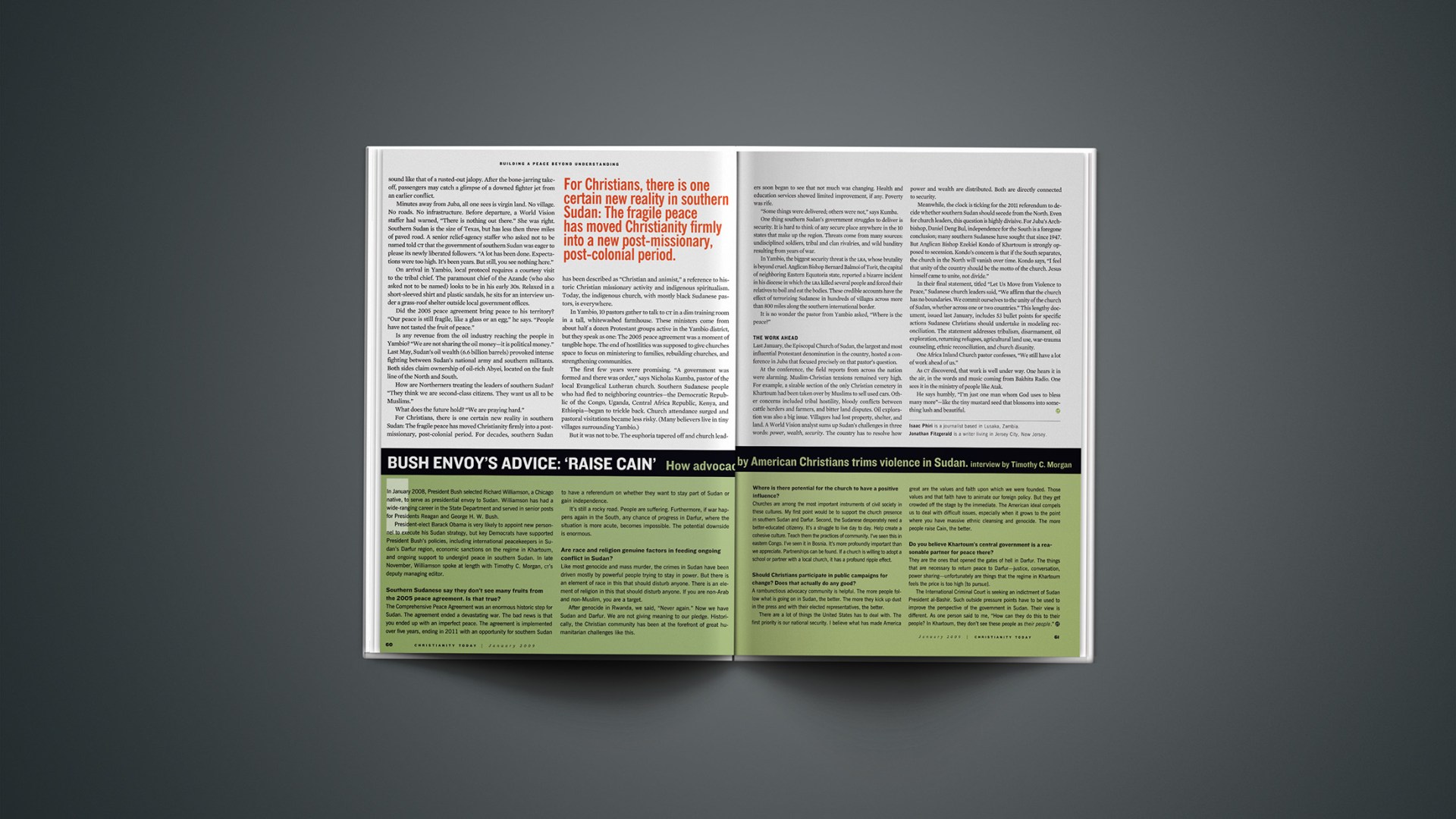In January 2008, President Bush selected Richard Williamson, a Chicago native, to serve as presidential envoy to Sudan. Williamson has had a wide-ranging career in the State Department and served in senior posts for Presidents Reagan and George H. W. Bush.
President-elect Barack Obama is very likely to appoint new personnel to execute his Sudan strategy, but key Democrats have supported President Bush’s policies, including international peacekeepers in Sudan’s Darfur region, economic sanctions on the regime in Khartoum, and ongoing support to undergird peace in southern Sudan. In late November, Williamson spoke at length with Timothy C. Morgan, CT’s deputy managing editor.
Southern Sudanese say they don’t see many fruits from the 2005 peace agreement. Is that true?
The Comprehensive Peace Agreement was an enormous historic step for Sudan. The agreement ended a devastating war. The bad news is that you ended up with an imperfect peace. The agreement is implemented over five years, ending in 2011 with an opportunity for southern Sudan to have a referendum on whether they want to stay part of Sudan or gain independence.
It’s still a rocky road. People are suffering. Furthermore, if war happens again in the South, any chance of progress in Darfur, where the situation is more acute, becomes impossible. The potential downside is enormous.
Are race and religion genuine factors in feeding ongoing conflict in Sudan?
Like most genocide and mass murder, the crimes in Sudan have been driven mostly by powerful people trying to stay in power. But there is an element of race in this that should disturb anyone. There is an element of religion in this that should disturb anyone. If you are non-Arab and non-Muslim, you are a target.
After genocide in Rwanda, we said, “Never again.” Now we have Sudan and Darfur. We are not giving meaning to our pledge. Historically, the Christian community has been at the forefront of great humanitarian challenges like this.
Where is there potential for the church to have a positive influence?
Churches are among the most important instruments of civil society in these cultures. My first point would be to support the church presence in southern Sudan and Darfur. Second, the Sudanese desperately need a better-educated citizenry. It’s a struggle to live day to day. Help create a cohesive culture. Teach them the practices of community. I’ve seen this in eastern Congo. I’ve seen it in Bosnia. It’s more profoundly important than we appreciate. Partnerships can be found. If a church is willing to adopt a school or partner with a local church, it has a profound ripple effect.
Should Christians participate in public campaigns for change? Does that actually do any good?
A rambunctious advocacy community is helpful. The more people follow what is going on in Sudan, the better. The more they kick up dust in the press and with their elected representatives, the better.
There are a lot of things the United States has to deal with. The first priority is our national security. I believe what has made America great are the values and faith upon which we were founded. Those values and that faith have to animate our foreign policy. But they get crowded off the stage by the immediate. The American ideal compels us to deal with difficult issues, especially when it grows to the point where you have massive ethnic cleansing and genocide. The more people raise Cain, the better.
Do you believe Khartoum’s central government is a reasonable partner for peace there?
They are the ones that opened the gates of hell in Darfur. The things that are necessary to return peace to Darfur—justice, conversation, power sharing—unfortunately are things that the regime in Khartoum feels the price is too high [to pursue].
The International Criminal Court is seeking an indictment of Sudan President al-Bashir. Such outside pressure points have to be used to improve the perspective of the government in Sudan. Their view is different. As one person said to me, “How can they do this to their people? In Khartoum, they don’t see these people as their people.”
Copyright © 2009 Christianity Today. Click for reprint information.
Related Elsewhere:
Christianity Today also posted a story on southern Sudan’s Christians who model a different kind of hope. CT also has previous coverage on Sudan.
BBC News and The Washington Post also have coverage sections on the conflict in Sudan. BBC also has a timeline and Q&A section on Darfur.
World Vision’s site has the organization’s latest news from Darfur.










